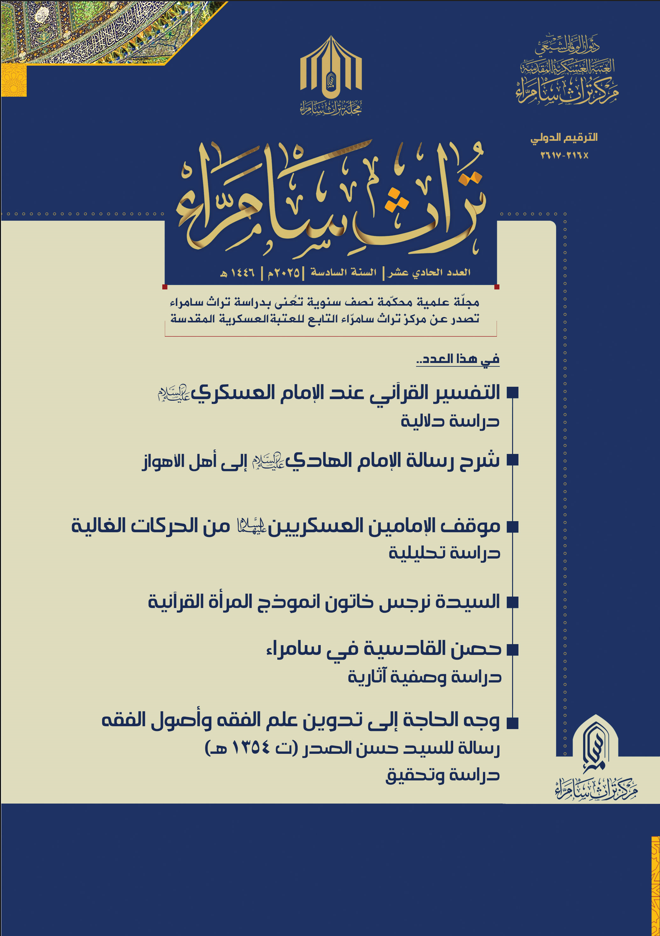Abstract
The study aims to examine the uniqueness of Imam Hasan Al-Askari (PBUH) in the Quranic interpretation of certain terms, which showed his distinctiveness in the interpretation. His belonging to the great Hashemite household represents the thought of the pure progeny, in which the principles, educational and moral values were embodied in their interpretations and narrations due to their close connection with the Greatest Messenger (peace be upon him and his pure household).
Imam Al-Askari’s interpretation has a great advantage, specificity, and uniqueness that distinguishes it from other interpretations. When we examine it, we find the silencing responses to various Islamic sects, including the Dahriyya (fatalists), the Dualists, the Jews, the Christians, and even the polytheists. It includes his interpretation of most of the terms mentioned in the Quran that are related to the Ahl Al-Bayt (prophet’s household) (PBUT) , such as his interpretation of the term "parents" in the Quran. In the narrations of the Ahl Al-Bayt (PBUT), there is confirmation of his interpretation based on the saying of the Messenger of Allah (peace be upon him and his household): "I and Ali are the fathers of this nation." It also confirms the educational and moral guidance that came in the Quran, and the prohibition of bad societal habits and values, including his prohibition of arguing without right. The study is divided into two sections: the first section includes his blessed biography, and the second one studies the interpretation of Imam Al-Askari (PBUH) according to specific guidelines, using a descriptive analytical approach.
Imam Al-Askari’s interpretation has a great advantage, specificity, and uniqueness that distinguishes it from other interpretations. When we examine it, we find the silencing responses to various Islamic sects, including the Dahriyya (fatalists), the Dualists, the Jews, the Christians, and even the polytheists. It includes his interpretation of most of the terms mentioned in the Quran that are related to the Ahl Al-Bayt (prophet’s household) (PBUT) , such as his interpretation of the term "parents" in the Quran. In the narrations of the Ahl Al-Bayt (PBUT), there is confirmation of his interpretation based on the saying of the Messenger of Allah (peace be upon him and his household): "I and Ali are the fathers of this nation." It also confirms the educational and moral guidance that came in the Quran, and the prohibition of bad societal habits and values, including his prohibition of arguing without right. The study is divided into two sections: the first section includes his blessed biography, and the second one studies the interpretation of Imam Al-Askari (PBUH) according to specific guidelines, using a descriptive analytical approach.
Keywords
Derivation.
Imam Al-Askari (PBUH)
linguistic interpretation
Quranic interpretation
Abstract
يسعى بحثنا إلى دراسة فرادة الإمام الحسن العسكري(عليه السلام) في التفسير القرآني لبعض الألفاظ، والتي سجّلت فرادته في التفسير الذي نُسِب إليه، ففي انتمائه إلى البيت النبوي العظيم تمثيل لفكر العترة الطّاهرة التي تجسدت فيها المبادئ والقيم التربوية والأخلاقية في تفسيراتها، ورواياتها، ولارتباطهم الوثيق بالرسول الأعظم (صلى الله عليه واله).
ولتفسير الإمام العسكري (عليه السلام) مزّية وخصوصية وفريدة عظيمة تميز بها عن بقية التفاسير؛ فحين نتصفحه نجد الردود المسكتة للفرق الإسلامية المختلفة، ومنها: الدهرية، والثنوية، واليهودية والنصرانية، بل والمشركين أيضاً، وفيه تفسيره لمعظم الألفاظ التي وردت في القرآن الكريم ولها علاقة بأهل البيت(عليهم السلام) كتفسيره للفظ الأبوين في القرآن الكريم، وفي روايات أهل البيت (عليهم السلام) مايؤكد صحة تفسيره لقول رسول الله (صلى الله عليه واله): " أَنَا وَعَلِيٌّ أَبَوَا هَذِهِ الْأُمَّةِ"، وفيها أيضاً مايؤكد التوجيه التربوي والخُلُقي الذي جاء في القرآن الكريم، والنهي عن العادات والقيم المجتمعية السيئة، ومنها نهيه عن الجدال بغير حق، وقسم على مبحثين حمل الأول منهما سيرته المباركة، ودرس ثانيهما تفسير الإمام العسكري(عليه السلام) على وفق توجيهات معيّنة، والدراسة على وفق المنهج الوصفي التحليلي.
ولتفسير الإمام العسكري (عليه السلام) مزّية وخصوصية وفريدة عظيمة تميز بها عن بقية التفاسير؛ فحين نتصفحه نجد الردود المسكتة للفرق الإسلامية المختلفة، ومنها: الدهرية، والثنوية، واليهودية والنصرانية، بل والمشركين أيضاً، وفيه تفسيره لمعظم الألفاظ التي وردت في القرآن الكريم ولها علاقة بأهل البيت(عليهم السلام) كتفسيره للفظ الأبوين في القرآن الكريم، وفي روايات أهل البيت (عليهم السلام) مايؤكد صحة تفسيره لقول رسول الله (صلى الله عليه واله): " أَنَا وَعَلِيٌّ أَبَوَا هَذِهِ الْأُمَّةِ"، وفيها أيضاً مايؤكد التوجيه التربوي والخُلُقي الذي جاء في القرآن الكريم، والنهي عن العادات والقيم المجتمعية السيئة، ومنها نهيه عن الجدال بغير حق، وقسم على مبحثين حمل الأول منهما سيرته المباركة، ودرس ثانيهما تفسير الإمام العسكري(عليه السلام) على وفق توجيهات معيّنة، والدراسة على وفق المنهج الوصفي التحليلي.
Keywords
الإمام العسكري(عليه السلام)، التفسير القرآني، التفسير اللغوي، الاشتقاق.
